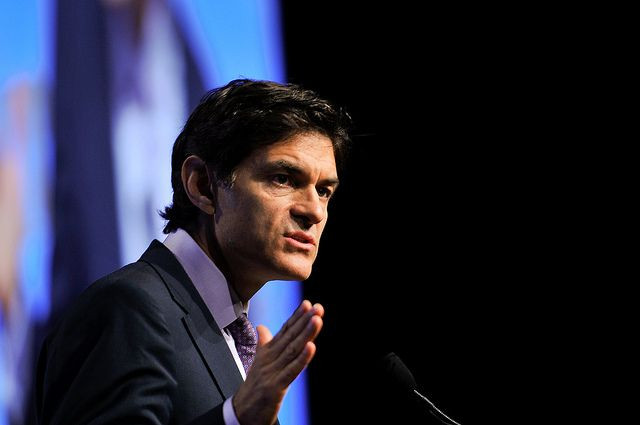Taking The Dr. Oz Show With A Grain Of Salt: On The Set With America’s Doctor

On the brink of the third week of the fifth season of The Dr. Oz Show, Dr. Mehmet Oz continues to be the “family doctor” for the nearly four million American households that watch his show daily. The Harvard-educated cardiovascular surgeon who has received a joint medical and M.B.A. degrees from the University of Pennsylvania earned his title as “America’s doctor” by Oprah Winfrey in a 2004 television appearance on the latter’s show, and since then, his fame and influence has only grown.
However, the medical ethics of Dr. Oz have been put into question by experts in the medical community. For example, the media doctor regularly reports on diet fads for weight loss and supplements to treat serious conditions like Alzheimer’s, in ways that some have regarded as insubstantial, dependent on incomplete data, and filled with distorted information.
The question critics ask: does the health advice that America’s doctor propagates on his show come from Dr. Oz the heart surgeon, or Dr. Oz the TV doctor?
Are Dr. Oz’s Product Recommendations Safe For You?
On an episode called “Green Coffee Bean Extract: The Fat Burner That Works!” Oz used buzz words such as “miracle pill” to capture the attention of American audience with an obsession for weight loss. The green coffee bean supplements were portrayed as a way to burn fat fast and easily.
To provide scientific evidence for his medical claims, the TV doctor cited a study that showed participants lost 17 pounds in 22 weeks by taking the “miracle pill” without doing any exercising or dieting. Although Oz referred to the study to support his claims, he omitted several details about the experiment itself.
The green coffee bean study, presented at the national meeting of the American Chemical Society in San Diego in March 2012 was a small one: there were 16 participants which is usually not enough to warrant statistical significance. There were also some methodological limitations. For example, the study’s authors claimed that green coffee bean supplements make you want to eat less. However, the study did not actually differentiate what the participants wanted to eat versus what they actually ate. In other words, they may have lost weight despite the supplement, and not because of it.
Even more damning is the fact that the study was funded by Applied Food Sciences, the American manufacturer of two green-coffee-extract products — a clear conflict of interest. On the show, Dr. Oz failed to tell his audience of this important detail.
Oz decided to do his own “TV study” and gave the “miracle pills” to two audience members for five days to see what would happen. Of course, a sample size of two participants would not suffice to provide accurate results for this type of study, nor would the short duration of five days. The two audience members were not randomly selected and were also well aware of what the “miracle pill” would do for them.
These two women reported they were less hungry, more energetic and lost two and six pounds, respectively. But really, those results are scientifically meaningless.
Slate Magazine reports these women most likely experienced a shape change because of the added pressure of knowing they would have to announce their weight on national TV and the strong placebo effect. In other words, the two participants could have made themselves believe these supplements would guarantee weight loss results, and the believe would then impact how they went about their daily activities to ensure weight loss was achieved.
“If studies are cited, then this cannot be, at the same time, a secret revealed just to you now. If the studies are any good, the effects are usually very small,” Victor Montori at the Mayo Clinic told Slate.
Words such as “breakthrough,” “miracle,” or “revolutionary” are often employed by Oz on his show to promote products to Americans — and they are often inaccurately used. If studies are used as references for these products then they are no longer a “secret” or “startling;” they are simply regarded as medicine. The medical community finds it troubling that Oz, a man of scientific merit, would employ these words that go against the nature of the products intend to describe.
Traditional Medicine Versus Alternative Medicine
Almost every week, Dr. Oz recommends a variety of products to the millions of American viewers at home. Michael Skeptor, a reporter for The New Yorker, asked “America’s doctor” if he was aware of the implications that his seal of approval has on the supplements he promotes on his television hit series.
"Surely you don’t think that all information is created equal?” Skeptor asked Oz.
“Medicine is a very religious experience,” Oz responded. “I have my religion and you have yours. It becomes difficult for us to agree on what we think works, since so much of it is in the eye of the beholder. Data is rarely clean.”
Oz’s opinion – which could be controversial – is that data isn’t everything. It’s always interpretable, and, therefore, it is better to choose the data that makes the most sense in a given context. The doctor affirmed every side will find arguments to support their data even if the data is “rarely clean.”
Oz’s belief is echoed in his operating room, where he encourages the practice of Reiki — the Japanese art of laying on hands — with the consent of the patient. This therapy is based on the notion that a patient’s state of mind could potentially affect successful surgical outcome. Scientific studies have no proven that Reiki has an impact, and it creates no visible outcomes; it’s a “life-giving source of energy [that] flows through our bodies,” The New Yorker reports.
Julie Motz, a Reiki master was hired by Oz to stand in the operating room so she can harness “the body’s own energy to help patients survive risky operations, such as heart transplants.”
Oz admits that there is no purely scientific data that Reiki works, but that’s not the point. The nature of complementary, or alternative medicine, is to make people feel comfortable. “Not everything that's measured is important, and not everything that's important can be measured,” he told the New York Daily News.
The same thing happens on his show: Oz will incorporate both alternative and scientifically-proven therapies without drawing a fine line between the two, a tactic that can confuse his television viewers.
A Heart Surgeon Or TV Celebrity?
There are two versions of Dr. Oz: Dr. Oz the heart surgeon and Dr. Oz the TV doctor. Oz is a reputable member of the medical community with excellent credentials, but many are skeptical as to why he is using his reputation to promote treatments and therapies that may be “bogus.”
"It appears there are two versions of Dr. Oz: the scientist and the showman," said Skeptical Scalpel, physician blogger to the Daily Briefing.
Richie Bryne, the full-time warm up comedian on Oz’s staff, serves to add a twist of comedy on a show where health can be a nerve-wrecking topic for studio audience members. “If you see something you want to react to, do it,” says Bryne to the audience before the taping of every show. Bryne doesn’t appear on the broadcast version of the show, but he gets the crowd going with a loud and raucous call to action: “Are you ready for Dr. Oz?”
After the warm up, Oz energetically comes on to take center stage and the audience members give him a standing ovation. Each and every show he sports the same outfit: blue scrubs and purple gloves. He’s a showman, communicating wonky aspects of medicine in a fun, exciting way, accompanied by vivid graphics of organs on the big screen behind him. He really does educate the American public about health issues.
But for some, the showmanship can undermine his legitimacy. It can be hard to take seriously a doctor who follows a comedian.
Behind The Scenes And On The Scene
I wanted to see “America’s doctor” in action, so I went to the ABC Studios for an afternoon taping of The Dr. Oz Show. On the show, I would not only be an audience member but also a participant for a “musical chairs” segment. They don’t tell you the exact nature of the segment, so you never know what will be discussed.
The set of The Dr. Oz Show was vivid, full of color, and even included an inflatable bounce-house with a ball pit, making the set seem like an indoor amusement park for kids, not a health talk show for adults. The atmosphere defied the conventional setting of a doctor’s office, filled with gimmicks that the audience would be a part of — it was more game show than clinic.

As the show is on its fifth season, the creators have said the brand-new season will include “...new stars, simple solutions and loads of surprises along the way.”
In the last five minutes before coming back from a commercial break, I was told by the producers that I would compete with four other participants in musical chairs. The game was used as a metaphor for what happens to your metabolism when you skip meals or make unhealthy food choices throughout the day. Scrimmaging along with four other participants to find a seat before the music stops was a fun challenge, and I felt like I learned something. I could even imagine that the millions of viewers who tune in everyday at home to watch Oz in action may have learned something, too.
Nevertheless, my experiences made it clear to me: on TV, not everything can be taken at face value or easily be translated into black and white. Dr. Oz may be a doctor, but he’s also out for ratings. So take what he says with a grain of salt, and make sure to talk to your (non-celebrity) doctor before committing fully to anything he says.



























